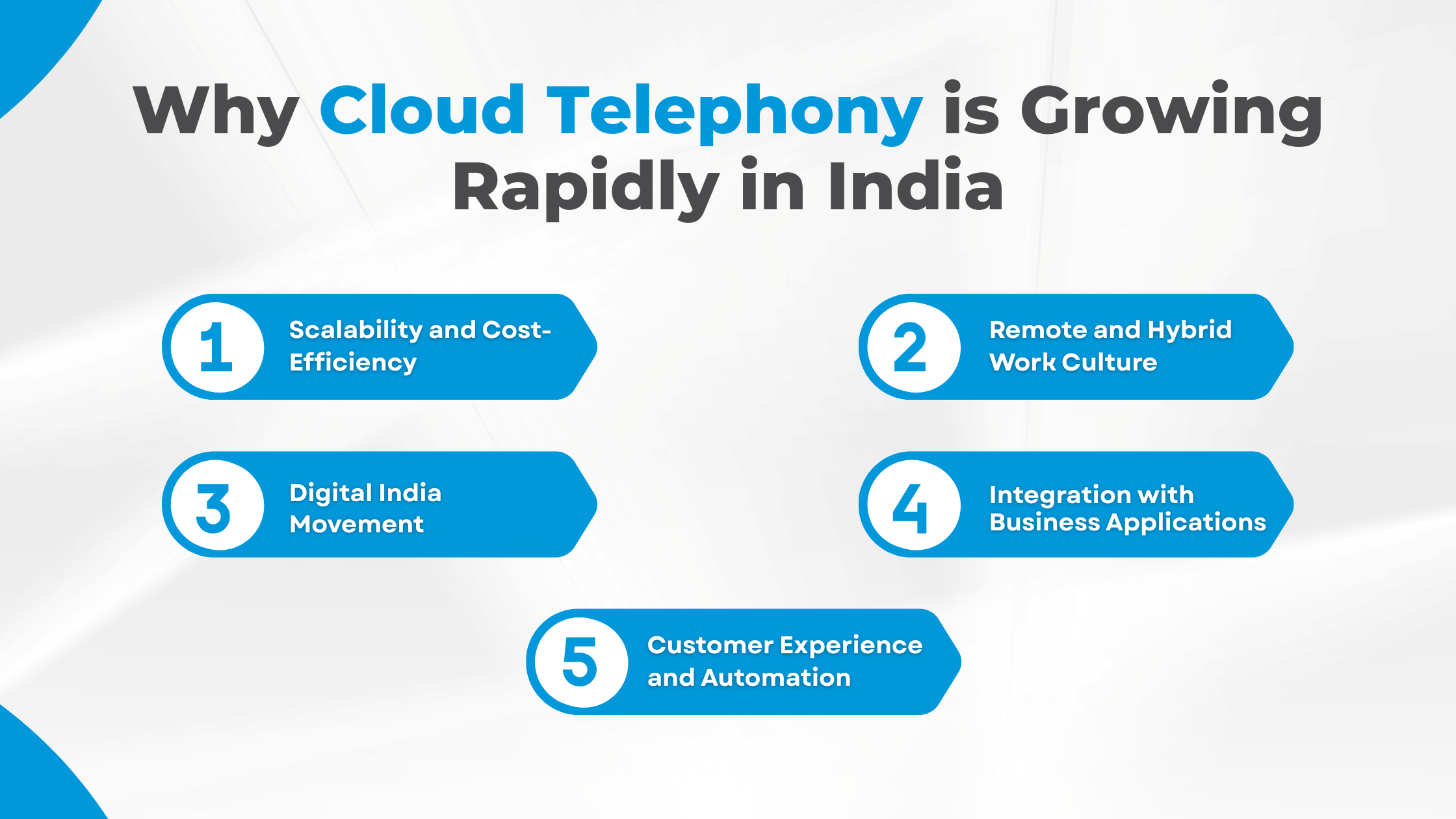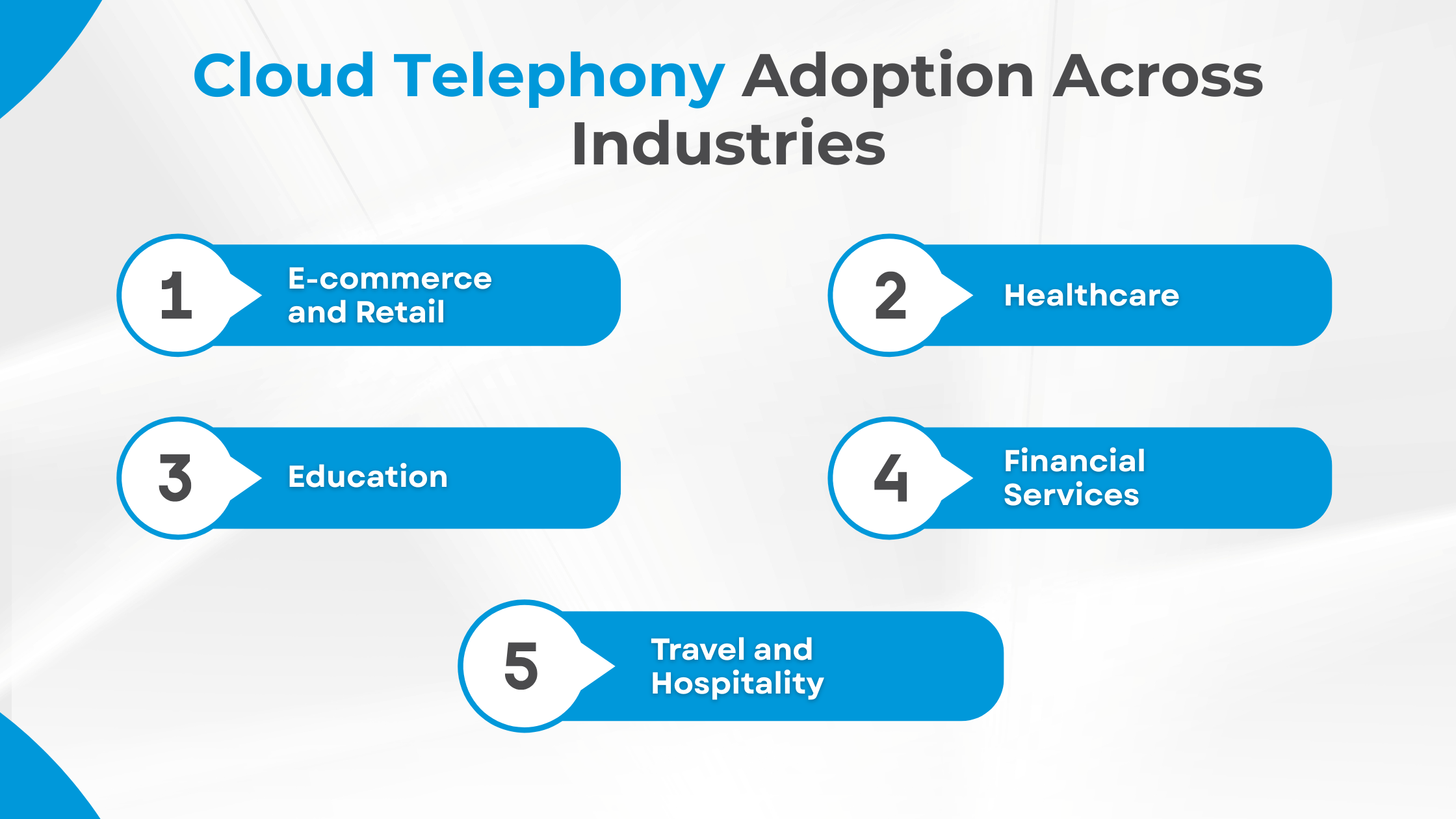In the fast-evolving landscape of business communications, cloud telephony in India has emerged as a transformative solution that redefines how organizations connect with their customers, employees, and partners. It has moved beyond being just an alternative to traditional phone systems to becoming an indispensable tool in enhancing productivity, cost-efficiency, and customer service. As Indian businesses, both large and small, embrace digital transformation, cloud telephony is gaining momentum due to its scalability, flexibility, and affordability.
This blog explores the evolving trends in cloud telephony, its growth trajectory in the Indian market, and a detailed overview of the best cloud telephony providers in India that are driving innovation in this domain.
Cloud telephony, also known as hosted telephony or cloud-based phone systems, is a communication technology that allows voice and messaging services to be operated through cloud infrastructure instead of traditional telephone lines or physical PBX systems. Simply put, it enables businesses to make and receive calls using the internet without the need for on-premise hardware.
In a conventional setup, companies rely on bulky telephony hardware, dedicated lines, and costly maintenance. Cloud telephony eliminates these limitations by hosting all backend systems on secure cloud servers. Users only need devices like smartphones, laptops, or IP phones, all connected through the internet.
A cloud telephony solution in India like Kommuno typically includes features like IVR (Interactive Voice Response), call forwarding, call recording, virtual numbers, toll-free numbers, SMS campaigns, and call analytics. These tools help businesses automate communication, improve customer interaction, and scale operations effortlessly.
One of the major benefits of cloud telephony is its scalability. Whether you’re a startup with five employees or a large enterprise with hundreds of support agents, the system can easily adjust to your needs. Cloud telephony also enables remote work and decentralized teams by allowing calls to be routed to any device, anywhere.
Integration is another strength. Cloud telephony platforms seamlessly connect with CRMs, helpdesks, and sales tools, ensuring all communication is tracked and accessible in one place. This not only improves workflow efficiency but also enhances customer service by making interactions more personalized and responsive.
In the context of cloud telephony in India, this technology is rapidly being adopted by sectors such as e-commerce, healthcare, education, finance, and logistics due to its cost-effectiveness, reliability, and support for multilingual communication. It’s no longer just an alternative to traditional telephony: it’s a smarter, future-ready solution for modern businesses.

One of the key reasons for the growing adoption of cloud telephony in India is its cost-effective nature. Traditional telephone systems involve hefty installation costs, maintenance, and upgrades. Cloud-based solutions eliminate these barriers by offering flexible pricing models that grow with business needs. Startups and SMEs especially benefit from this model as they can avoid upfront capital expenditures.
The rise of remote work, accelerated by the COVID-19 pandemic, has pushed companies to adopt solutions that support flexible communication. Cloud telephony at Kommuno allows employees to work from anywhere while still using a centralized communication system. This flexibility ensures continuity in customer service and internal communication even during lockdowns or regional restrictions.
The Digital India Movement, launched by the Government of India, has played a pivotal role in accelerating the country’s digital transformation. Aimed at empowering citizens and businesses through improved digital infrastructure and internet connectivity, the initiative has created fertile ground for cloud-based technologies to flourish, including cloud telephony in India.
Additionally, programs like Startup India and Make in India have supported innovation in the SaaS and telecom sectors, encouraging local development of cloud telephony solutions in India. As the movement continues to evolve, cloud telephony is set to become a cornerstone of India’s digital-first economy.
Modern cloud telephony platforms are API-driven, meaning they can be easily integrated with popular tools like Zoho CRM, Leadsquared, and others. This seamless integration enables businesses to create automated workflows, monitor call performance, and provide personalized customer experiences.
Customer expectations have grown, and companies need to respond with instant, intelligent communication. Cloud telephony enables businesses to automate call routing, deliver prompt responses, and track every customer interaction, ensuring better service quality.
Artificial Intelligence (AI) is transforming how cloud telephony solutions work. Voice bots, predictive dialing, speech analytics, and sentiment analysis are becoming part of advanced telephony systems. AI helps in optimizing customer support, predicting customer behavior, and ensuring smoother call routing.
Communication Platform as a Service (CPaaS) is on the rise. It allows developers to integrate voice, SMS, and video calling functionalities directly into their apps without building complex infrastructure. Voice APIs enable custom call flows, making communication more contextual and personalized.
Businesses are moving beyond voice. Integrated platforms now support SMS, email, WhatsApp, and chatbots. Cloud telephony providers in India are increasingly offering unified communication platforms where all customer touchpoints are managed from a single interface.
With India’s linguistic diversity, businesses are offering IVRs and support systems in multiple regional languages to serve a wider audience. Leading providers like Kommuno now enable easy customization of call flows based on location and language preferences.
Data security and compliance with telecom regulations have become priorities. Providers are implementing encryption, data masking, and robust verification protocols to protect user data and comply with the Telecom Regulatory Authority of India (TRAI) guidelines.

In the e-commerce sector, cloud telephony helps manage order confirmations, delivery tracking, and customer support. Virtual numbers and IVRs ensure that every inquiry is directed to the right department.
Hospitals and clinics use cloud telephony to manage appointment scheduling, patient follow-ups, and emergency call routing. It enables remote consultations and improves patient engagement.
Ed-tech platforms rely on automated calls and SMS alerts for enrollment campaigns, exam notifications, and parent-teacher communications. Cloud telephony streamlines outreach and administration.
Banks and insurance companies leverage cloud-based telephony for KYC verification, EMI reminders, and fraud detection. Call recordings are crucial for compliance and dispute resolution.
Travel agents and hotel chains use Kommuno’s cloud telephony to handle bookings, cancellations, and feedback. Automated IVRs can manage a high volume of queries without human intervention.
When selecting a cloud telephony solution in India, businesses must consider several key factors:
The future of cloud telephony in India is poised for unprecedented growth, driven by advancements in technology, changing workplace dynamics, and increasing demand for customer-centric communication. As businesses continue to move away from legacy systems, cloud-based communication platforms will become the default choice across industries.
One of the key enablers of this shift will be the expansion of 5G networks, which promise higher speed and lower latency. This will improve call quality, enable smoother video communication, and enhance real-time collaboration across platforms. Additionally, AI and machine learning will play a greater role in optimizing customer interactions through intelligent call routing, voice analytics, and conversational bots. Cloud telephony will also become more deeply integrated with CRMs, help desks, and business process automation tools. This will empower organizations to create unified communication strategies and deliver personalized customer experiences at scale.
Small and medium businesses (SMEs) in Tier 2 and Tier 3 cities will increasingly adopt cloud telephony due to its affordability and ease of deployment. As digital literacy improves and more businesses go online, the demand for secure, scalable, and multilingual communication solutions will surge. Data security and compliance will remain a focal point, especially in sectors like finance, healthcare, and education. Cloud telephony providers will continue to invest in encryption, regulatory alignment, and uptime guarantees to win customer trust.
Cloud telephony is no longer a luxury: it’s a necessity in today’s fast-paced, digitally driven business environment. With its promise of cost-efficiency, scalability, and seamless integration, cloud telephony in India is revolutionizing how companies interact with their stakeholders. As businesses increasingly adopt cloud telephony solutions, choosing the right platform and partner becomes crucial for long-term success.
Whether you are a startup looking to automate support or a large enterprise aiming to unify communication, the cloud telephony solution in India offers unmatched potential. By selecting from the best cloud telephony providers in India, such as Kommuno, businesses can ensure a future-ready communication strategy that fuels growth, improves customer satisfaction, and drives innovation.
Elevate Your Business Game with Kommuno – The best way to stay connected to customers!
Copyright ©2024 All Rights Reserved | Kommuno Technologies Pvt Ltd
Copyright ©2024 All Rights Reserved | Kommuno Technologies Pvt Ltd